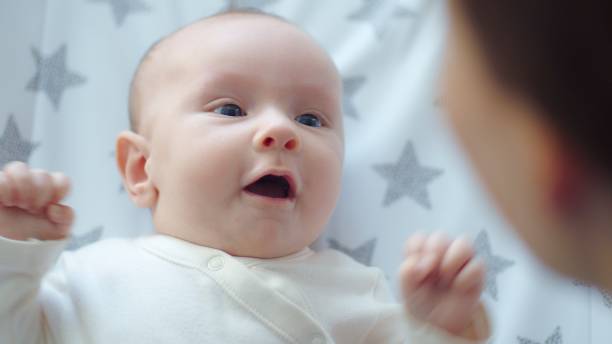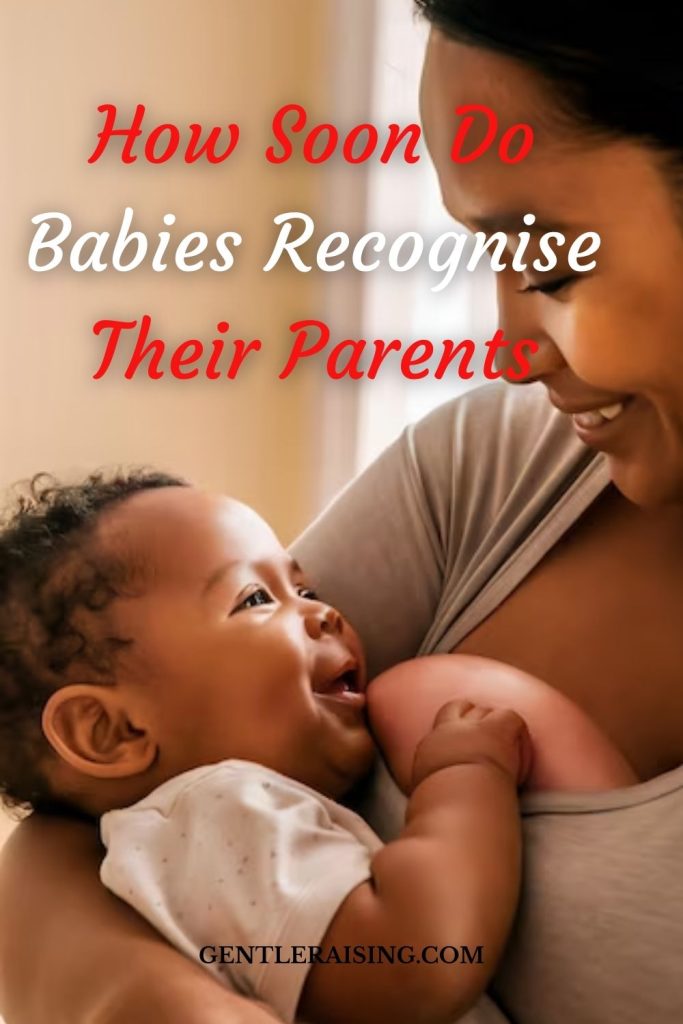You know those quiet 3 a.m. moments when you’re cradling your newborn, your eyes bleary, your body aching, and suddenly you wonder, “Does my baby even know I’m their mom?”
It’s not a silly thought. In fact, it’s one of the most common questions new mothers have. You feed them, soothe them, rock them back to sleep, but do they know it’s you? Do they feel the connection the same way you do?
Let’s walk through what science says, what real life looks like, and how those tiny cues can signal something big: recognition, the beginning of a lifelong bond.
Babies are Born with Superpowers (Just Not the Ones You Expect)
When your baby is born, their brain isn’t fully “online” yet, not in the way ours is. But they arrive with remarkable tools to help them bond with you, even from day one.
- Sight? Limited at first. Your baby can only see about 8–12 inches away (perfect distance to see your face during a feed).
- Hearing? Sharp. They’ve been hearing your voice from inside the womb.
- Smell? Superhuman. Yep. Newborns can recognise their mother’s scent within days of birth.
- Touch? A comfort cue. Skin-to-skin contact helps regulate their temperature, heart rateand deepens your bond.
So, while they may not recognise you the way we recognise someone in a crowd, they already know who you are by your scent, your voice, and your presence. That’s huge.
Week-by-Week: How Baby Recognition Develops
0–3 Weeks: A Familiar Scent, A Soothing Voice
From the very beginning, your baby is primed to seek you out.
They turn their head toward your voice. They calm when they hear your heartbeat. They root toward you when they smell your skin, especially during breastfeeding. These aren’t coincidences. This is the baby’s early, built-in radar.
It’s not recognition in the adult sense yet, but it’s the beginning of something powerful: association.
“Mom = warmth, food, comfort, safety.”
Even in these early days, your baby starts putting the pieces together.
3–8 Weeks: Wait. That Face Looks Familiar!
Babies love faces, especially yours.
They start to focus more intently, holding eye contact for longer stretches. During a feed, they might gaze up at you. That dreamy, milk-drunk stare? It’s part of how they’re learning what love looks like.
They also begin to mimic facial expressions, especially yours. Try smiling during tummy time; you might get a smirk back. And it’s not just gas. That’s early social development right there.
2–3 Months: Smile Recognition Begins
This is where the magic starts to show.
Your baby might light up when they see your face. You walk into a room, and they kick their legs excitedly. They might stop crying the second you pick them up, even before you speak.
That’s not luck. That’s the early stage of true recognition.
They know you.
Your scent. Your rhythm. Your touch. Your face. Your heartbeat.
You’re not just a body that shows up. You’re mom.
4–6 Months: Recognition in Full Swing
By now, your baby is likely all about you.
You may notice:
- They follow you across the room with their eyes.
- They coo or babble when you talk to them.
- They reach for your face or hair.
- They quiet down faster when you’re near.
It’s not just love, it’s recognition rooted in emotional connection.
Interestingly, around this time, babies can also start recognising other regular caregivers, dad, grandma, and nanny, so long as those relationships are consistent and nurturing.
6–9 Months: Separation Anxiety Arrives (And That’s A Good Sign!)
This stage can feel emotionally charged.
Your baby may cry when you leave the room. They might cling when someone else tries to hold them. And while that can tug at your heartstrings, it’s also a big milestone.
Because what they’re saying is:
“I know who my person is. And when you’re not here, I miss you.”
That’s powerful.
They’ve not only recognised you, they’ve emotionally attached to you.
9–12 Months: Full Recognition & Preference
At this point, the recognition becomes clearer, deeper, and more emotionally nuanced.
Babies this age might:
- Crawl or scoot toward you when they need comfort.
- Laugh at your specific silly faces or sounds.
- Mimic your expressions or moods.
- Refuse to be soothed by anyone else.
- Show delight when you return, even after just a few minutes away.
Your baby knows exactly who you ar and what you mean to them.
So, When Exactly Does A Baby Recognize Their Mother?
If we’re being technical, recognition starts at birth, through smell and sound.
Visual and emotional recognition take a bit longer, typically between 2–4 months, and continue developing throughout the first year.
But here’s the thing: it’s not a light switch moment. It’s a gradual, beautiful layering of sensory input, emotional cues, and secure attachment.
Your baby is getting to know you a little more every day, through every touch, glance, and lullaby.
Can Dads Be Recognised Too? What About Other Caregivers?
Absolutely.
Babies don’t just recognise mothers; they recognise anyone who is consistent, loving, and present.
So dads, adoptive parents, grandparents, and other primary caregivers can build just as strong a bond through:
- Regular eye contact
- Talking or singing
- Gentle physical touch
- Consistent care (feeding, playing, soothing)
Recognition is not about biology. It’s about bonding through presence and love.
Cultural Clues: A Global Take on Bonding
Not every culture defines parenting in the same way, and that shapes how babies bond and recognise caregivers.
In some communities, babies are passed around often, cared for by aunties, siblings, or grandparents. In others, they’re worn on their mother’s body 24/7.
Neither approach is “better.” They’re simply different paths to the same goal: security, familiarity, love.
So if you’re parenting in a way that looks different from your friend’s Instagram feed, don’t stress. Recognition thrives in consistent, loving care, no matter the cultural container.
Does Postpartum Depression Affect Baby Recognition?
That’s a gentle but important question.
Postpartum depression (PPD) can impact how much time or emotional energy a mom feels able to give. That, in turn, might delay bonding or recognition a bit.
But, and this is vital, babies are resilient, and support makes a difference. Even small consistent gestures (a calm touch, a soft word) build connection.
If you’re struggling, please know: it’s not your fault. And you’re not broken. Help is available, and recognition is never “too late” to develop.
How Can I Help My Baby Recognise Me?
Great question, and the answers are beautifully simple.
Here are some ways to support recognition:
- Skin-to-skin contact: Especially in the early days, this helps with bonding, calming, and smell recognition.
- Talk to your baby often: Your voice is their favourite sound. Narrate what you’re doing, sing, or whisper sweet nothings.
- Eye contact: During feeding, diaper changes, or just cuddling, hold their gaze. It builds trust.
- Consistent routines: Babies thrive on predictability. Familiar patterns help them feel safe and help them link that safety to you.
- Respond to their cues: Whether it’s a hungry cry or a sleepy whimper, responding helps them learn that “Mom sees me. Mom knows.”
But What If My Baby Doesn’t Seem to Recognise Me?
Don’t panic.
Some babies take a little longer, especially if:
- They were born prematurely
- They’ve had many different caregivers
- There have been health challenges or NICU time
Recognition can still develop; sometimes it just needs more time and contact. Keep showing up. Keep loving. Keep connecting.
And if you ever feel worried, trust your gut and speak with your paediatrician. Support is always there.
A Real-Life Story: Nora & Eli
Nora, a first-time mom, shared her story:
“For weeks I worried my baby didn’t know me. He didn’t smile much, didn’t make eye contact, and seemed just… blank. I thought maybe I was doing something wrong. Then one morning, I leaned over his crib, and he smiled so big, like sunshine burst through his face. And I just knew, He knows me. I’m his person.”
Sometimes, the recognition is quiet. Sometimes, it’s dramatic. Either way, it’s real. And it’s coming.
In a Nutshell: Recognition Timeline
Here’s a quick summary you can screenshot:
| Age | What Baby Recognizes |
|---|---|
| Birth | Mom’s voice, smell, heartbeat |
| 0–3 wks | Turns toward mom’s voice, calms in her arms |
| 1–2 mos | Brief eye contact, responds to touch and warmth |
| 2–4 mos | Starts smiling at familiar faces, increased alertness |
| 4–6 mos | Reaches for mom, babbles in response |
| 6–9 mos | Separation anxiety begins, strong emotional preference |
| 9–12 mos | Mimics mom, seeks her comfort, lights up at her return |
And You Know What? You’re Doing Great
Seriously. If you’re asking whether your baby recognises you, it means you care. And that’s half the work of parenting: being emotionally present.
Even on the days when your shirt is stained with spit-up and your hair hasn’t seen a comb, you are the most beautiful, familiar face in the world to your baby.
They don’t need perfection. They need you.
Every rock, every shush, every sleepy kiss on the forehead, it’s all adding up. Your baby is learning:
“This is my mom. She loves me. I know her.”
And that, my friend, is the beginning of everything.

